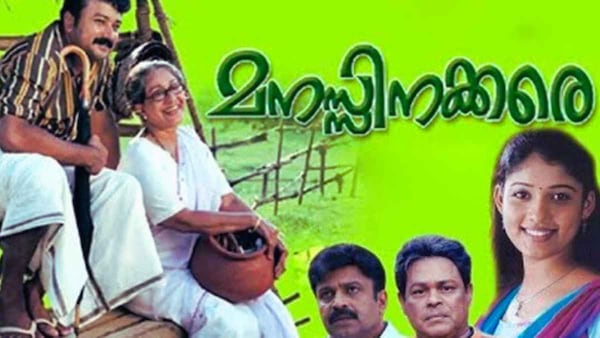Manassinakkare: Revisiting Nayanthara’s debut film
The Malayalam film turns 20 later this year while Nayanthara turns 39

Last Updated: 11.23 AM, Nov 19, 2023
Nayanthara is arguably one of the most recognisable actresses in India today. After cementing her status as a Tamil, Telugu, and Malayalam cinema legend, she has finally forayed into Bollywood for the first time in her career spanning two decades. And she couldn’t ask for a bigger blockbuster to star in than Atlee’s Jawan, alongside Shah Rukh Khan. The film might be a run-of-the-mill Atlee film with a healthy dose of over-the-top action, cheesy dialogues, and a larger-than-life hero, but its record-breaking run at the box office has propelled Nayanthara to nationwide fame. However, her journey to the top has been long and eventful. In fact, if one were to revisit her debut in the 2003 Malayalam film Manassinakkare, she would be barely recognisable. This perhaps has a lot to do with her dramatic physical transformation over the years and the evolved image and position of actresses today. That said, the Sathyan Anthikad film remains one of her best films and deserves a second watch if not a first.
Manassinakkare and perhaps, the 2004 film Rappakal, starring Mammootty, might be Nayanathara’s most grounded films to date – a sharp contrast to the films that garnered her immense fame and popularity. Set in a rural town in Kerala, Manassinakkare tells the story of a wealthy elderly woman, Kochu Thresia, who forms an unlikely friendship with a young man, Reji, after fracturing her relationship with her children. The film examines the socio-political and economic landscape of Kerala at the time, and how it changed drastically over the ‘80s and ‘90s. The film leans on its lead characters Kochu Thresia and Reji to detail how the distribution of wealth in society has witnessed an overhaul over the decades. But most importantly, it is a social commentary on class and caste discrimination in Kerala.

Malayalam screen veteran Jayaram plays the role of the free-spirited Reji, who decides to spark a bit of joy and happiness in Thresia’s mundane life – after her children curtail her freedom citing her age. Reji essentially becomes the son she hoped her children would have become. While the film’s message that anyone born into privilege will treat others with contempt is exaggerated and slightly outdated, it manages to deliver a convincing narrative that tries to remain grounded in realism. Malayalam screen legend, Sheela, best known for her starring roles alongside Prem Nazir made her comeback after a 20-year hiatus. In fact, as a hat tip to the celebrated onscreen pair, it is insinuated in the film that Kochu Thresia’s late husband is an archetype of a Prem Nazir character.
Nayanthara slips into the role of Gauri, Reji’s no-nonsense neighbour and the two gradually develop feelings for each other. Gauri could’ve been relegated to being just the one-dimensional ‘love interest’ of the lead star. Instead, writer Ranjan Pramod and director Sathyan Anthikad have added intricacies and nuance to her character. She represents the socialist movement that stripped Kerala of unequal wealth and property distribution that was rampant in the post-independence era. While this aspect is never explicitly mentioned, her eventual marriage with Reji can be construed as controversial even by modern Indian standards. Both Reji and Gauri belong to different castes and religions, while Gauri is brought up in a household that advocates communism.
Sathyan Anthikad’s captivating drama released in an era in Malayalam cinema that was riddled with subpar as well as problematic films such as Kaliveedu, Narasimham, and Ravanaprabhu among others Manasinakkare was among the few bright spots in Malayalam cinema in the 2000s – an era that reeked of misogyny, toxic masculinity, and other forms of discrimination in the form of caste, colour, and class. While it certainly lacks the filmmaking excellence of modern Malayalam films such as Kumbalangi Nights, Nanpakal Nerathu Mayakkam, Ee.Ma.Yau., or C U Soon, the film’s well-written humour, social commentary, and intriguing characters help it establish itself as one of the finest Malayalam films of the 21st century, and it also paved the way for one of the biggest female stars in Indian cinema. Nayanthara would find immense recognition and fame in the Tamil film industry after her debut in Ayya in 2005. Films such as Billa (2007), starring Ajith Kumar, firmly established her as a force to be reckoned with in Indian cinema.


 Premium
Premium